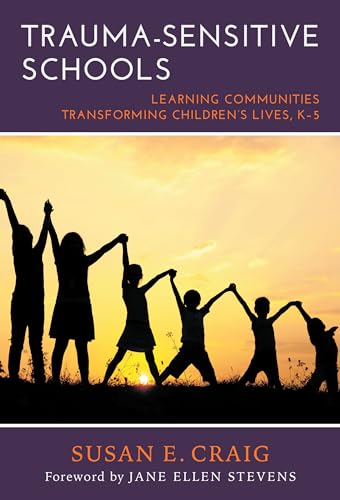Trauma-Sensitive Schools
Learning Communities Transforming Children's Lives, K-5
Susan E. Craig
BOOK REVIEW

In a world where the silent scars of trauma whisper through the halls of our educational institutions, Trauma-Sensitive Schools: Learning Communities Transforming Children's Lives, K-5 emerges as a beacon of hope and understanding. Authored by the insightful Susan E. Craig, this book is not merely a guide; it is a profound call to action for educators seeking to innovate and heal the very fabric of the classroom experience. 🌍✨️
Craig, with her extensive background in both education and psychology, dismantles the outdated paradigms of teaching that often ignore the emotional and psychological needs of students. Instead, she champions an educational approach meticulously crafted around understanding and addressing trauma. This isn't just theory-it's an urgent, emotionally-charged manifesto aimed at reshaping the learning environments where some of our most vulnerable children find themselves trapped in cycles of fear and alienation.
Every page of this book reverberates with the raw, unfiltered realities faced by children who come to school not just to learn ABCs or solve math problems, but to navigate the tempestuous waters of their personal traumas. As Craig intricately lays out, the data illustrates a startling truth: the emotional scars many carry impede not only learning but also social interactions and mental well-being. Schools are not merely places of academic pursuit; they are sanctuaries where healing can begin, and Craig's framework provides the essential tools to make this transformation possible.
What defines a trauma-sensitive school? One might ask. It's not just about recognizing the signs of distress but cultivating an entire ecosystem where compassion leads the charge-the kind of environment where teachers are trained to listen, and students feel safe to express their struggles without fear of judgment. Craig emphasizes the need for cooperation among educators, parents, and mental health professionals to create a cohesive support system that uplifts each child, rather than letting them slip through the cracks of an often unforgiving system.
The reader is drawn into a poignant narrative that threads together heartbreaking statistics and compelling anecdotes. Individual stories come alive-like those of children who have turned their pain into resilience under the right guidance, proving that with understanding and care, recovery is not just a possibility; it's a reality within reach. The testimonies of teachers who have embraced these methodologies illustrate a powerful testament to the book's efficacy, as they recount moments of breakthrough and connection with their students.
Yet, the journey isn't free of challenges. Critics may argue about the scalability of these practices in underfunded districts, or they may question if trauma-sensitive training can be adequately integrated into existing curricula. These concerns are valid, as the educational landscape often operates at a frustrating pace-slow to adapt, resistant to change. However, Craig's work protests against the status quo, igniting a fire of urgency for meaningful reform. After all, what's more critical than a child's ability to learn from a place of safety and belonging?
Moreover, Craig doesn't shy away from addressing the complexities surrounding trauma-a rich tapestry woven from the threads of poverty, neglect, and systemic inequities that disproportionately affect marginalized communities. Her clarity in articulating these issues forces us, as readers, to confront uncomfortable truths about societal structures that continue to fail the very individuals they are meant to serve. The discomfort is necessary; it's a necessary heart-wrenching awakening that leaves you with a thirst for action long after the final page is turned. 💔
Every educator, administrator, and advocate who has ever doubted their ability to make a difference should immerse themselves in Trauma-Sensitive Schools. It's a potent combination of research-backed strategies and heartfelt pleas that implores us not to forget-the children we teach are far more than a dataset; they are individuals with stories, burdens, and dreams. The transformation initiated by Craig's insights could very well light the torch for a new understanding of what it means to educate with empathy.
The final chapter resonates not just as an ending, but as a beginning. The implications of Craig's work extend well beyond the walls of any classroom. They call upon us all-parents, community leaders, policymakers-to build a society that prioritizes healing and educational equity. As you set this book aside, let it stir something deep within you, igniting a commitment to foster communities that transform lives, not merely through knowledge, but through compassion, understanding, and profound love for the next generation. 🌟
Every moment spent ignoring the cries of troubled youth is a moment lost in potential. Whether you are entrenched in the world of education or merely a concerned citizen, the journey into the realms of Trauma-Sensitive Schools is an exploration worth undertaking. Stand with Susan E. Craig-be the change, be the listener, be the healer. Don't let another child slip through the cracks, for their futures are hanging in the balance!
📖 Trauma-Sensitive Schools: Learning Communities Transforming Children's Lives, K-5
✍ by Susan E. Craig
🧾 160 pages
2015
#trauma #sensitive #schools #learning #communities #transforming #childrens #lives #susan #craig #SusanECraig